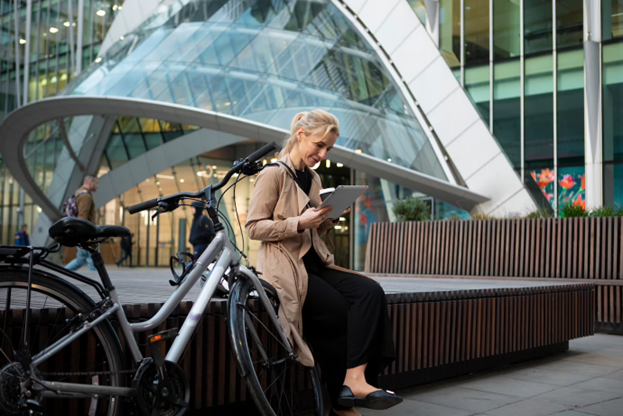The Power of a Community - Building Sustainable Commuting Practices Together
May 12, 2023
iCrowdMarketing powered by iCrowdNewswire

Different forms of transportation are now faster and more accessible than ever, but as climate change intensifies, it is important to encourage communities to reassess their habits and start working towards less damaging solutions. Turning to more eco-friendly commuting is a huge step towards a more sustainable future, and the following practices can help cities and their residents reduce CO2 emissions and still travel comfortably. Take a look at the following ideas for a more sustainable approach to commuting.
Improvement of Public Transportation
Public transportation is one of the most efficient and earth-friendly ways to commute since buses and certain trains almost match the speed of personal cars. However, the current public systems could be better, and improving their infrastructure is a sure way to invest in more sustainable communities.
Firstly, if the existing methods of public transportation were more affordable, more people would be encouraged to switch from car rides to shared vehicles. The same would happen if the cities made an effort to boost the frequency of bus lines that are in high demand.
Moreover, it is important to give more attention to multimodal transportation that helps passengers complete their journeys easily. There is a lot of benefit in creating a functional infrastructure for first and last-mile connections. Providing convenient bicycle parking and safe walkways for pedestrians. Other useful forms of multimodal transportation include bicycle-sharing and electric scooter programs that help users close a gap between two essential spots such as their office and the nearest bus stop.
Bike Riding
Bike riding is one of the most eco-friendly modes of transportation out there, and at the same time, it is incredibly efficient. Riding a bike gets you from point A to point B with a surprising rate of speed, and the journey will cost you nothing, since it uses only the power of your body. Of course, you will need to get a bike and change the tires from time to time, but compared to other means of transport, we’re talking about minor costs.
Cycling is ideal for short-distance routes, and committing to it daily can also improve your overall health. As a form of exercise, bike riding in Europe was largely affected by Covid-19, forcing people to switch to indoor activities. However, the popularity of cycling in the UK during the pandemic remained more or less the same. They still heavily rely on driving and public transport for their commuting purposes. Cycling in the Netherlands, however, speaks for itself. They are well-known for their eco decisions when it comes to commuting and take their contribution to a better climate seriously.
Carpooling
Even though cars are responsible for 12% of the total greenhouse gas emission in Europe, the damaging effects depend largely on how we use them. If each person uses their vehicle all the time, the community wastes more gas per passenger. On top of that, it also increases the number of cars on the road which leads to traffic congestion and less efficient travel conditions.
On the other hand, when you and your friends, neighbours, or colleagues decide to carpool, you directly reduce the chances of traffic jams, as well as the gas emission per person. Moreover, carpooling is a great way to improve your home budget by reducing your personal gas expenses.
Electric and Hybrid Cars
Electric and hybrid cars are a decent idea for those who cannot give up the comfort and ease of a personal vehicle but still want to reduce their negative impact on the environment. Electric cars are fueled by electricity, and hybrid ones use a combination of electricity and gas. And even though they are not as eco-friendly as some other means of transport, their fueling methods reduce emissions.
This is true even in cases when the electricity used by cars is produced through non-renewable methods that produce greenhouse gas. Moreover, many hybrid vehicles rely on energy-efficient technologies such as regenerative braking which also reduce the consumption of fuel.
Flexible Work Hours
Companies that allow flexible work conditions like working from home, working part-time, or being able to leave the office early are part of a positive change when it comes to sustainability efforts in the corporate world. For example, being allowed to work fewer hours in a day or having flexible start and finish times for the shift makes it easier for people to take public transport, or casually ride a bike or walk to work.
If more people wouldn’t have to go to work at approximately the same time, there would be fewer traffic jams at peak hours, and if more companies embraced working from home as a business model, the pollution from car emissions would also drop significantly.
The way we choose to go from one place to another has a direct impact on our planet’s well-being. Even if you cannot always stick to eco-friendly methods, it is important to contribute to positive changes in your community. Building more sustainable transportation systems can help communities reduce the overall consumption of fossil fuels, which directly impacts the quality of air and the health of everyone in the area.
Tags: English